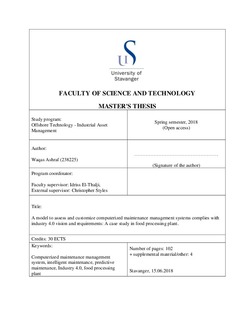| dc.description.abstract | The transformation from Industry 3.0 to Industry 4.0 is rapidly increasing in several industrial sectors where the automated production systems have become more as a cyber-physical and advanced production system. Internet of things (IoT), cyber-physical system, computational intelligence, cognitive capabilities and other disruptive technologies are the key enabling technologies for Industry 4.0. Recent developments in data acquisition techniques i.e. smart sensors has made it possible to initiate change from the bottom level of complex physical systems. Cyber-physical systems have become smart enough to interconnect physical and digital world. Cognitive and computational intelligence capabilities of digital systems have been utilized to control physical equipment with minimum or zero human interference.
The transformation into industry 4.0 vision is quite demanding for several industrial sectors. Transforming the automated asset into a cyber-physical asset is a complex task since the operators need to ensure that their asset is first smart and then develop smart operations in terms of managing the maintenance and executing the required tasks. Smart asset means that the asset e.g. machine should be able to provide/share data about its behavior. Smart maintenance management operations mean that the asset data will be stored, processed, visualized in an automated and cognitive manner by utilizing several disruptive technologies related to automation of work processes e.g. predictive maintenance, artificial intelligence.
From an operator point of view, the computerized enterprise resource planning (ERP) and maintenance management systems (CMMS) e.g. SAP are the most important parts of the entire digital transformation since most of the other systems can be provided by service providers e.g. algorithms, cloud platforms. However, the operators need to deal with ERP and CMMS on daily bases and almost all acquired data from the asset will be stored and presented via those systems. CMMS is the core interface between the operator and entire digitalized production system. Thus, the operators shall be enabled to assess which CMMS (as several commercial systems are available) is most cost-effective for their applications, support the completeness of industry 4.0 vision and provide capabilities to be customized.
Concerning these needs, the purpose of this thesis is to determine the key acceptance criteria of selecting CMMS and customization aspects that are required to develop cost-effective CMMS for a specific application.
By keeping in view about requirements, a case study on an electromechanical system has been selected for this thesis where a predictive maintenance program and associated CMMS are developed. Based on this development, the key acceptance criteria and customization aspects for developing cost-effective CMMS are extracted. Moreover, industry 4.0 framework has been applied to upgrade the equipment to meet advanced manufacturing requirements. Research work is carried out on a critical processing equipment named single retention time (SRT) freezing tunnel at Gate Gourmet, United Kingdom. Systems analysis approach has been used to demonstrate case study work.
• I have used systems analysis to analyze how the selected physical system can be retrofitted to be smarter.
• I have developed a Predictive maintenance (PdM) programme for the selected system based on intelligent maintenance layers.
• I have developed a CMMS to support the PdM programme.
• I have extracted the key acceptance criteria of selecting CMMS and customization aspects that are required to develop cost-effective CMMS.
Chapter four provides a clear result of using systems analysis, which is an effective methodology to extract the failure modes, symptoms, and potential process parameters that can be monitored to detect abnormalities. The applied systems analysis of the selected physical system is an effective methodology to extract the failure modes, symptoms (required for health monitoring), and potential process parameters (required for data-driven approach) that can be monitored to detect abnormalities.
The systems analysis of the potential predictive maintenance program highlights the complexity due to the compliance with industry 4.0 requirements of the cyber-physical system at different layers (7 layers). The integrity and work process automation are main requirements to develop effective predictive maintenance program. Moreover, the developed predictive maintenance program clearly expands the expected functionality of the associated CMMS. It requires CMMS to be smarter (not just a database) by being as user interface integrator between assets (physical machines, human operations) and cyber systems (analytics, transmissions).
The systems analysis of CMMS resulted in identifying the technical functionalities and stakeholders needs with the key acceptance criteria to assess the commercial CMMS and to customize them toward the specific stakeholder's needs. The key acceptance criteria are mainly related to functionality toward increasing data volumes, velocities, veracities, and varieties, visualization, accessibility, privacy, security, interoperability with other systems, usability, scalability, affordability, and completeness to vision.
This thesis can serve as a fundamental guideline of how to analyze your physical systems to identify the requirements for developing smarter assets, predictive maintenance program, and CMMS. The extracted key acceptance criteria for selecting CMMS is significantly important to either select the best commercial option or to customize the existing CMMS solution. | nb_NO |
